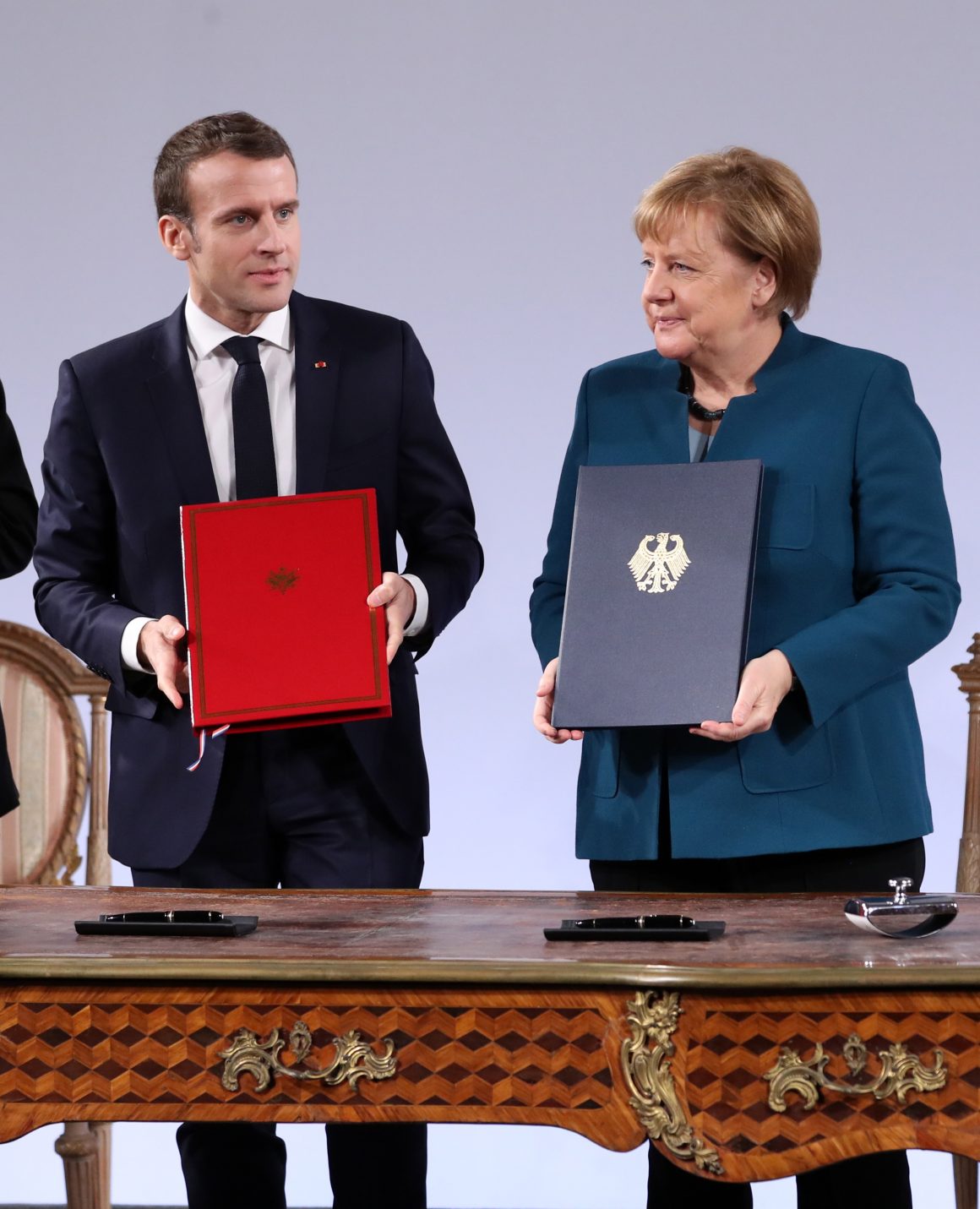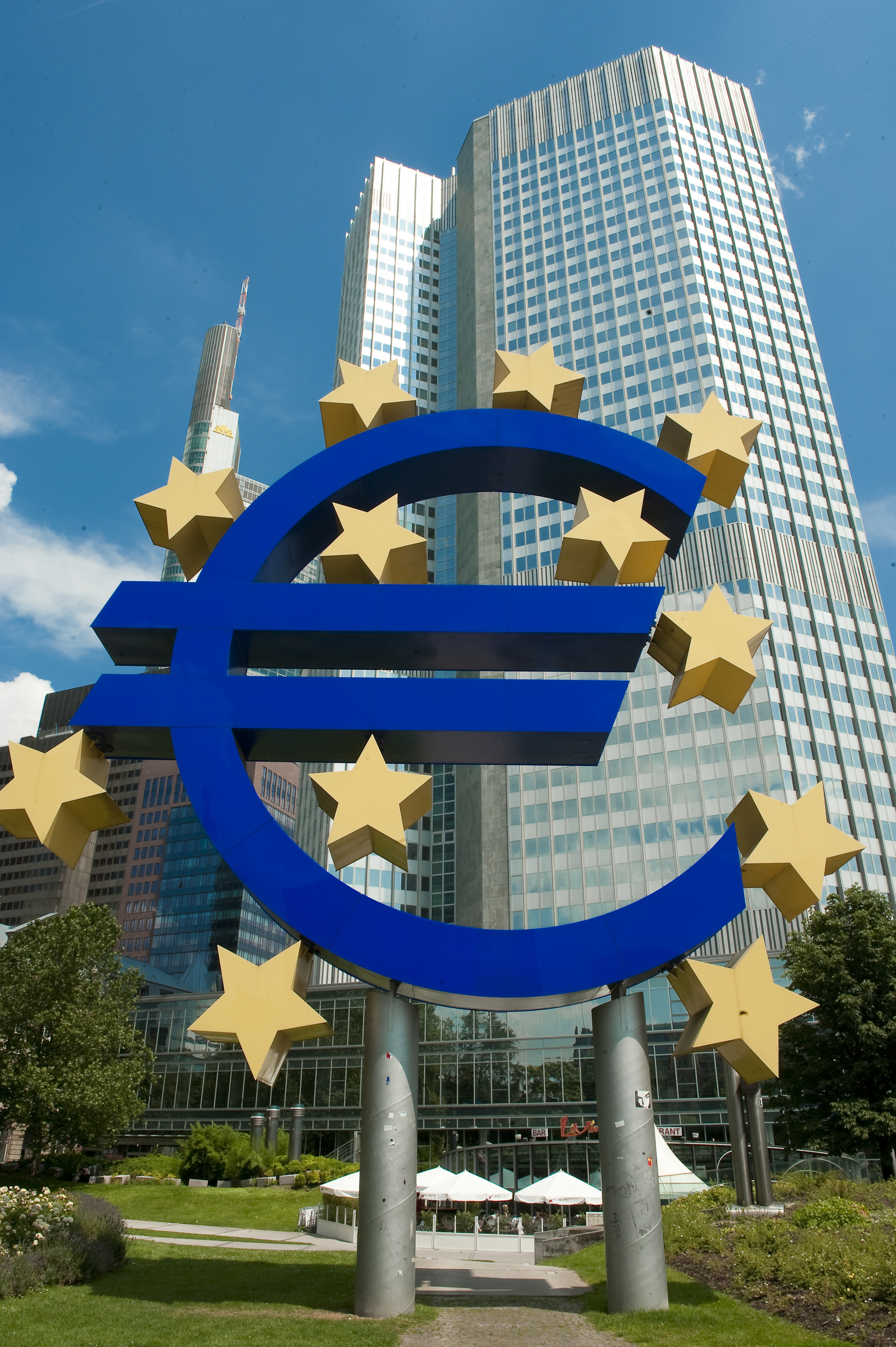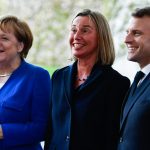THE WARSAW INSTITUTE REVIEW
Date: 5 July 2019 Author: PhD, Krzysztof Rak
Franco-German Strategic Dissonance
From the outside, everything seems to be perfectly fine. Politicians hold solemn anniversary celebrations. On January 22, 2019, French President Emmanuel Macron and German Chancellor Angela Merkel ceremonially renewed their vows from the Elysée Treaty. However, even an inattentive observer of European politics knows that there is nothing left of the famous “motor of EU integration” and that the leaders of both countries are not even able to agree on the general principles of a common strategy.
 GERMAN CHANCELLOR ANGELA MERKEL (R) AND FRENCH PRESIDENT EMMANUEL MACRON (L) SIGN A NEW FRANCO-GERMAN FRIENDSHIP TREATY IN AACHEN, GERMANY, 22 JANUARY 2019. PRESIDENT MACRON AND CHANCELLOR MERKEL SIGN A NEW FRIENDSHIP TREATY, INTENDED TO SUPPLEMENT THE 1963 ELYSEE TREATY, PLEDGING TO PROVIDE DEEPER ECONOMIC AND DEFENSE TIES AND COMMITMENT TO THE EU. © FRIEDEMANN VOGEL (PAP/EPA)
GERMAN CHANCELLOR ANGELA MERKEL (R) AND FRENCH PRESIDENT EMMANUEL MACRON (L) SIGN A NEW FRANCO-GERMAN FRIENDSHIP TREATY IN AACHEN, GERMANY, 22 JANUARY 2019. PRESIDENT MACRON AND CHANCELLOR MERKEL SIGN A NEW FRIENDSHIP TREATY, INTENDED TO SUPPLEMENT THE 1963 ELYSEE TREATY, PLEDGING TO PROVIDE DEEPER ECONOMIC AND DEFENSE TIES AND COMMITMENT TO THE EU. © FRIEDEMANN VOGEL (PAP/EPA)Generalities of the treaty
The new treaty was supposed to symbolize a new beginning, sending a signal that Paris and Berlin are still capable of serving as European directorate. But upon taking a closer look at the provisions of the treaty, one could notice their conceptual emptiness. While the two parties to the agreement declared in the preamble that “the time has come to take their bilateral relations to the next level,”no new ideas have been put forward since then in addition to what has already been repeated for years. What is typical for the treaty is its first article, under which “the two countries shall deepen their cooperation on European policy. They shall promote an effective and strong common foreign and security policy and shall strengthen and deepen the Economic and Monetary Union. They shall strive to complete the single market and work towards a competitive Union with a strong industrial base as a foundation for prosperity, promoting economic, fiscal and social convergence as well as sustainability in all its dimensions.”Similar style and content are characteristic for most of the remaining 27 articles. More detailed information is contained in the chapter on security policy, with the two countries agreeing to strengthen Europe’s ability to act autonomously in the international arena. Also, the ‘Franco-German Defence and Security Council’ was established as a joint political body. However, what is most important in the document is what has not been included: a shared vision of the European Union, which could be an answer to its problems, among which are the eurozone crisis or migration issues. And this simply means that France and Germany have not reached agreement on a joint strategy for European policy.
Macron’s struggle to survive
Such an agreement is longed for by French President Emmanuel Macron who believes that any tilt in the current EU policy will help him to solve the problems confronted by his country. There is no doubt that his political future will much depend on whether he is capable of pushing through his European ideas because his earlier attempts to bring about economic and social reform ended in failure, as exemplified by yellow vest protests. This explains his consistency in calling on Germany to implement the said reforms as otherwise, he will be unable to put them in place. Macron’s general idea is to transfer more competencies to the supranational level, burdening the EU institutions with problems that national governments are unable to cope with. Macron would, in particular, seek to solve the problem of the systemic dysfunctionality of the eurozone, which resulted in dividing the EU into debt-ridden and non-developing countries in the south on one side, with France standing closer and closer to them, and into creditor countries in the north on the other with Germany as a leader, all of which do quite well economically. The crisis is manifested by the German trade surplus, triggered to a great extent by the European single currency. Following advice from economists who are not blinded by the dogmas of neoliberalism (e.g. Stiglitz), the French president would intend to prevent the split of the EU into creditors and debtors by creating a mechanism for massive financial transfers redistributed from rich countries (creditors) to the poor ones (debtors) while transforming the eurozone into a so-called transfer union. He therefore calls for establishing a common budget for the eurozone under the supervision of the EU Minister of Finance (lecture at the Sorbonne, September 2017).
Angela Merkel was more or less assertive in rejecting such proposals because she did not imagine that Germany would spend tens of billions of euros every year to subsidize the poor south. This prompted Macron to change his tactics. In his speeches, he no longer demands money from the richest but seeks to intensify EU cooperation, making it both centralized and bureaucratized by setting up new supranational institutions. In doing so, he probably assumes that deepened political and institutional cooperation will ultimately force Member States to increase their contribution to the EU budget. This approach found its reflection in an article published by President Macron at the beginning of March 2019 in major European newspapers, in which he called for a European Renaissance and blamed nationalists for all crises that plagued Europe. Incidentally, Macron’s extremely ideological diagnosis seems absurd at first sight because these mythical nationalists should be in consequence found guilty of the decomposition of the eurozone and the migration crisis. The recipe for nationalists ‘ plots is to “build this renewal [of Europe] together around three ambitions: freedom, protection and progress,”by creating a number of new European institutions, including European Agency for the Protection of Democracies, European Asylum Office, European Council for Internal Security, European Security Council, European Climate Bank, European Sanitary Inspection and European Innovation Council. It is noteworthy that most of these councils and offices already exist yet bear slightly different names than those proposed by Macron (for instance, in what way would a European Council for Internal Security be different from the already-existing Justice and Home Affairs Council?). Finally, the French leader suggested setting up a Conference for Europe in order to draft a new EU treaty. One cannot help but get the impression that Macron’s European policy comes down to a belief: more bureaucracy and ideology, and the problems will solve themselves.
German game of wait and see
Berlin would not at all have to respond to Paris’ minor and uncontroversial proposals, at least when it comes to German interests. Also, it could try to keep it quiet, or at least declare its willingness to discuss the matter, in order to save face and dignity of the French President. But new CDU leader Annegret Kramp-Karrenbauer (referred to by her initials AKK) responded to Macron’s call only a few days later in an article “Getting Europe right”.
At first glance, it can be noticed that AKK made efforts to free the European discourse of ideology. Unlike Macron, she did not reprimand nationalists in an authoritative manner. Instead, she pointed to populists as opponents, although partially and indirectly admitting they are right and claiming that “the forthcoming elections to the European Parliament cannot focus upon defending the imperfect status quo of today’s EU against populist accusations.”In the further part of her article, AKK rejected expresses verbisEuropean centralism, European statism, the communitarization of debts, the Europeanisation of social systems, and the minimum wage, thus both openly and decisively questioning Macron’s vision and leaving virtually no room for a future Franco-German compromise. Also, she dismissed amendments to the European Treaties, suggesting “pro-European elites” and not societies to stand behind them. What is more, AKK broke with the current position of the CDU, as the party sought to find a recipe for EU crises in subsequent attempts to deepen integration processes under the slogan of “more Europe!”The vision laid out by the new CDU chief conveys tough realism that has long not resonated in German politics. It is worth recalling what AKK said in her most famous statement: “There is no version of a European super state which can live up to the goal of a Europe made up of sovereign Member States, and able to take action. The work of the European institutions cannot claim any moral superiority over the collaborative effort of national governments. A new Europe cannot be founded without the nation states: they provide democratic legitimacy and identification. It is the Member States that formulate and bring together their own interests at the European level. This is what gives Europeans their international weight. Europe must focus on subsidiarity and the individual responsibility of the nation states, and at the same time be capable of acting in the common interest. Our Europe should therefore stand on two equal pillars: the Intergovernmental method and the Community method. We should, simultaneously, also take long overdue decisions, and abolish anachronisms. The latter include the European Parliament’s concentration on Brussels and the taxation of the income of EU officials.”
Undoubtedly, European realism in AKK’s views is a virtue, yet her article contains no proposal on how to tackle the eurozone crisis, referred to as the most critical European issue. And this is its fundamental weakness. Economists seem to agree that the eurozone will not become an optimal currency area in the near future. And if so, one of two possible solutions needs to be adopted in order to avoid a meltdown along with all its unpredictable consequences: create a transfer union, as it was laid out by Macron, or lead to a controlled decomposition of the eurozone, for instance by splitting it into two currency areas, with one bringing together wealthy creditors and another reserved for poor debtors. So, unlike Macron, AKK does not put forward any ideas on how to save Europe from an economic slump.
 GERMANY, FRANKFURT JULY 2, 2009. SYMBOL OF THE EURO CURRENCY BEFORE THE EUROPEAN CENTRAL BANK. © WIKTOR DĄBKOWSKI (PAP)
GERMANY, FRANKFURT JULY 2, 2009. SYMBOL OF THE EURO CURRENCY BEFORE THE EUROPEAN CENTRAL BANK. © WIKTOR DĄBKOWSKI (PAP)What’s next?
AKK’s response to Macron’s proposals, although relatively mild and diplomatic, leaves little doubt that France and Germany will shortly fail to reach a compromise regarding fundamental issues on Europe’s fate.
This, in turn, is very bad news for Macron who fell into a political trap. He is today too weak to carry out a bold autonomous reform that would increase the competitiveness of the French economy while reducing the social costs of the French welfare state. French society does not want reforms and is ready to take quasi-revolutionary steps against those politicians who would engage in difficult and painful changes. So, Macron has no other solution than to acknowledge the status quo, give up politics and focus on his own image, which is what he seems to do best. This is why he will probably not make any efforts to face up to the excessive power of Germany as the significant decades-long challenge for the European policy of France. It is recalled that European integration, followed by Elysée treaties, was meant to grant Paris control over the Bonn Republic as the latter was at the time becoming stronger and stronger. After de Gaulle’s methods proved no longer effective in the 1970s, the French decided to balance German influence in Europe by giving the go-ahead for the United Kingdom’s joining European Communities. In the 1990s, soon after the reunification of Germany, they replaced the Deutsche mark with the euro in a bid to diminish Germany’s power. In doing so, Paris strove to solve the problem of Berlin’s excessive superpower by adopting two methods: linking the two countries together with political and economic bonds or, although less often, by trying to create a proper balance of power in Europe. Once adopted nowadays, these methods prove no longer valid because France has established strong ties with its eastern partner while being unable to break free of its grip – so strong that France does not even make attempts to balance between European countries. And yet it could balance German influence by building strong ties with Washington – especially after Trump had abandoned the “leadership partnership” policy with Berlin – with the indebted countries in the southern part of the eurozone, becoming their natural leader in the fight against the German trade surplus, or at least revitalize the traditional alliance with Central European countries.
If this all seems so obvious, why does not the French leader introduce these solutions? It is noteworthy that one of Macron’s predecessors, Nicolas Sarkozy, theoretically had such an option but failed to grasp an opportunity. This case indicates rather a systemic cause. France is making no bids to balance Germany’s influence not because it has unreasonable and blind politicians but because it simply cannot do so. It fell victims of its own policy, binding Germany and France to that extent that the strength of these ties gave Berlin control over a weak France and not the other way around. Complicated plans often lead to counterproductive effects. And that is precisely what happened to the eurozone. When Mitterrand forced the introduction of the euro upon Kohl, he intended to limit the growing influence of the united Germany. In consequence, the German economy holds today a hegemonic position in Europe, as exemplified by its persistent trade surplus.
Hence it is hardly surprising that Germany’s political elites strongly dismiss Paris’s risky reform ideas. It is in their interest to maintain the status quo for as long as possible because they have comfortable conditions for governing the country and administer a balanced budget. From their perspective, any change will be a change for the worse. Once pursued in this manner, Germany’s policy will be backed by other creditor countries that benefit from the eurozone crisis. And paradoxically, maintaining the current status quo suits also the ruling elites of the debt-ridden countries in the south. Courageous and socially painful reforms will put an end to their power provided that the democratic rules of the game are observed.
Among those that reaped substantial benefits from the current eurozone meltdown are the new EU Member States that have not adopted the euro. The single currency certainly impedes to a great extent the development and prosperity of southern European countries. Incidentally, some economists claim that it slows down the pace of the economic growth of Germany and all countries referred to as creditors (Hans Werner Sinn). And this means that, thanks to the systemic euro crisis, countries such as Poland and the Czech Republic will more promptly reach the average limit of the EU GDP.
Almost everyone holds an interest in maintaining the status quo. This stems from an opportunistic approach of the European political class whose members may be deprived of their authority once changes take place. But this state of affairs will not last forever. The causes of the crises afflicting Europe have not yet been eliminated. The biggest mine remaining under the EU is the single currency; the eurozone has never been and still is not an optimum currency area. Accordingly, the business cycle will sooner or later lead to a Europe-wide meltdown, bringing about unpredictable consequences. But European politicians have broken thermometers and are now pretending that everything is fine.
All texts published by the Warsaw Institute Foundation may be disseminated on the condition that their origin is credited. Images may not be used without permission.














